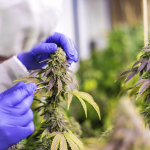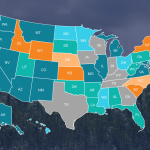While adult-use cannabis remains illegal in the state, the latest Legislative Session for Texas paved the way for an expansion of the state’s existing medical-use program. Like many previous Legislative Sessions, the majority of the bills in support of cannabis failed, such as Texas HB 441, HB 2593, and HB 3948. Unlike previous years, the 87th Legislative Session saw the passage of two important bills in support of cannabis, psilocybin, and other alternative drug treatments: HB 1535 and HB 1802.
HB 1535
The passage of HB 1535 provides the greatest expansion in access to cannabis in the state since the initial implementation of the medical-use program. This bill goes into effect on 9/1/2021 and will expand the limited list of conditions by providing eligibility for medical-use cannabis. Post-Traumatic Stress Disorder (PTSD) and chronic pain for which a doctor previously would have prescribed opioids were added as qualifying conditions to receive medical-use cannabis. The passage of this bill also expanded access to cancer patients who, under previous legislation, could only receive cannabis after a terminal diagnosis. Additionally, this bill also provides a caveat for the Texas Department of State Health Services to expand upon this list of qualifying conditions further in the future.
Another important change that this bill initiates is an increase to the THC cap in the state. While current legislation only allows for a THC percentage of 0.5%, Texas HB 1535 increases this cap to 5%. This bill would also create compassionate-use institutional review boards to evaluate and approve proposed research programs to study the medical use of low-THC cannabis in the treatment of certain patients.
HB 1802
The second bill to pass through the 87th Legislative Session is HB 1802 and this new legislation went into effect on 6/18/2021. This bill requires the state to study the medicinal or therapeutic effects of alternative drug treatments, such as psilocybin, MDMA, and ketamine. Texas will now study these drugs for their ability to treat depression, anxiety, PTSD, bi-polar disorder, chronic pain, and migraines. Texas will use this research to evaluate and determine whether alternative therapies are effective in treating mental health and other medical conditions and compare the efficacy of psilocybin, MDMA, and ketamine to current treatments. The results of this study will be reported by December 1, 2022.
Current Texas Cannabis Market
The Texas Department of Public Safety initially licensed three medical cannabis licenses, but only two are in operation. For those businesses that are licensed, they participate in a vertically-integrated program in which they cultivate, process, and dispense low-THC medical cannabis. Since cannabis flower and smoking cannabis products are still illegal in the state, medical cannabis products are processed into medicines, oils, and lozenges with the low-THC cannabis.
Although Texas has not announced additional licenses at this time, the passage of these bills is a sign that the state is making progress toward increasing access to cannabis. With bipartisan support for the expansion of the Texas cannabis program, it is likely that increased licensing will happen in the future.
Texas may not be the center of the cannabis industry yet, but the state’s expansive arable land and experience in agriculture will likely help propel the market if/when the state does choose to legalize recreational cannabis. Additionally, the state’s large metropolitan areas and increased population could serve to create a demand for cannabis that rivals market giants like California and Illinois.
How Can Sapphire Risk Help?
Tony Gallo and the team at Sapphire Risk Advisory Group have over 30 years of security experience and expertise. Sapphire has worked in 32 states, including Texas. Follow us on social media to stay up to date with Texas cannabis industry updates!
Authors
- California Senate Bill 69 Adds CEQA Requirements for New Cultivators

- Top 5 Cannabis Security and Surveillance Violations

- Peace of Mind in the Retail Sector: Facility Security

- Opportunities in the Ohio (O-High-O) Cannabis Market

- Building Security and Trust: Verifying Identification and Payments

- The Importance of Loss Prevention

- Thoughts to Improve Cannabis Security Regulations Across the Nation

- Opportunities in the Minnesota Cannabis Market

- U.S. Cannabis Legalization 2023 Update

- How to Present Your Cannabis Business Vision to Your City




